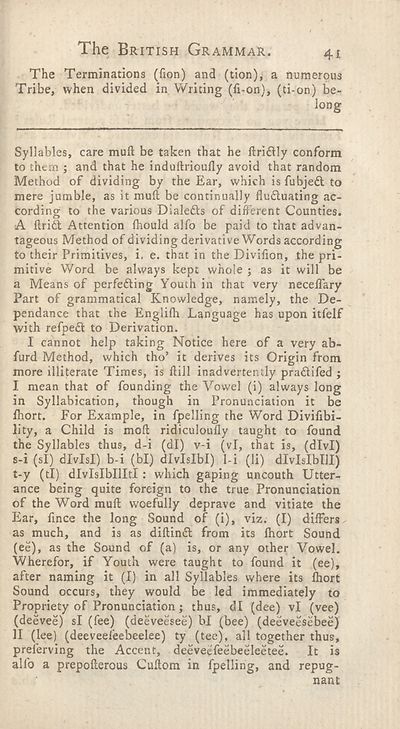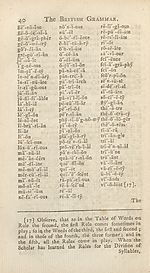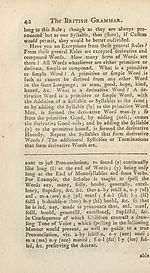Education > British grammar: or, an essay, in four parts, towards speaking and writing the English language grammatically, and inditing elegantly
(89)
Download files
Complete book:
Individual page:
Thumbnail gallery: Grid view | List view

The British Grammar. 41
The Terminations (fion) and (tion), a numerous
Tribe, when divided in Writing (fx-on), (ti-on) be¬
long
Syllables, care mull be taken that he ftriflly conform
to them ; and that he induftrioully avoid that random
Method of dividing by the Ear, which is fubjeft to
mere jumble, as it muft be continually flu&uating ac¬
cording to the various Dialefts of different Counties.
A ftridt Attention Ihould alfo be paid to that advan¬
tageous Method of dividing derivative Words according
to their Primitives, i. e. that in the Divifion, the pri¬
mitive Word be always kept whole ; as it will be
a Means of perfefting Youth in that very neceffary
Part of grammatical Knowledge, namely, the De-
pendance that the Englifh Language has upon itfelf
with refpedt to Derivation.
I cannot help taking Notice here of a very ab-
furd Method, which tho’ it derives its Origin from
more illiterate Times, is ftill inadvertently pradlifed ;
I mean that of founding the Vowel (i) always long
in Syllabication, though in Pronunciation it be
fhort. For Example, in fpelling the Word Divilibi-
lity, a Child is mod ridiculoufly taught to found
the Syllables thus, d-i (dl) v-i (vl, that is, (dlvl)
s-i (si) dlvlsl) b-i (bl) dlvlslbl) 1-i (li) dlvlslblll)
t-y (tl) dlvlslbllltl: which gaping uncouth Utter¬
ance being quite foreign to the true Pronunciation
of the Word mud woefully deprave and vitiate the
Ear, fince the long Sound of (i), viz. (I) differs
as much, and is as didindl from its fhort Sound
(ee), as the Sound of (a) is, or any other Vowel.
Wherefor, if Youth were taught to found it (ee),
after naming it (I) in all Syllables where its fhort
Sound occurs, they would be led immediately to
Propriety of Pronunciation; thus, dl (dee) vl (vee)
(deevee) si (fee) (deeveesee) bl (bee) (deeveesebee}
II (lee) (deeveeleebeelee) ty (tee), all together thus,
preferving the Accent, deeveefeebeeleetee. It is
alfo a prepoderous Cudom in fpelling, and repug¬
nant
The Terminations (fion) and (tion), a numerous
Tribe, when divided in Writing (fx-on), (ti-on) be¬
long
Syllables, care mull be taken that he ftriflly conform
to them ; and that he induftrioully avoid that random
Method of dividing by the Ear, which is fubjeft to
mere jumble, as it muft be continually flu&uating ac¬
cording to the various Dialefts of different Counties.
A ftridt Attention Ihould alfo be paid to that advan¬
tageous Method of dividing derivative Words according
to their Primitives, i. e. that in the Divifion, the pri¬
mitive Word be always kept whole ; as it will be
a Means of perfefting Youth in that very neceffary
Part of grammatical Knowledge, namely, the De-
pendance that the Englifh Language has upon itfelf
with refpedt to Derivation.
I cannot help taking Notice here of a very ab-
furd Method, which tho’ it derives its Origin from
more illiterate Times, is ftill inadvertently pradlifed ;
I mean that of founding the Vowel (i) always long
in Syllabication, though in Pronunciation it be
fhort. For Example, in fpelling the Word Divilibi-
lity, a Child is mod ridiculoufly taught to found
the Syllables thus, d-i (dl) v-i (vl, that is, (dlvl)
s-i (si) dlvlsl) b-i (bl) dlvlslbl) 1-i (li) dlvlslblll)
t-y (tl) dlvlslbllltl: which gaping uncouth Utter¬
ance being quite foreign to the true Pronunciation
of the Word mud woefully deprave and vitiate the
Ear, fince the long Sound of (i), viz. (I) differs
as much, and is as didindl from its fhort Sound
(ee), as the Sound of (a) is, or any other Vowel.
Wherefor, if Youth were taught to found it (ee),
after naming it (I) in all Syllables where its fhort
Sound occurs, they would be led immediately to
Propriety of Pronunciation; thus, dl (dee) vl (vee)
(deevee) si (fee) (deeveesee) bl (bee) (deeveesebee}
II (lee) (deeveeleebeelee) ty (tee), all together thus,
preferving the Accent, deeveefeebeeleetee. It is
alfo a prepoderous Cudom in fpelling, and repug¬
nant
Set display mode to:
![]() Universal Viewer |
Universal Viewer | ![]() Mirador |
Large image | Transcription
Mirador |
Large image | Transcription
| Antiquarian books of Scotland > Education > British grammar: or, an essay, in four parts, towards speaking and writing the English language grammatically, and inditing elegantly > (89) |
|---|
| Permanent URL | https://digital.nls.uk/136145622 |
|---|
| Description | Thousands of printed books from the Antiquarian Books of Scotland collection which dates from 1641 to the 1980s. The collection consists of 14,800 books which were published in Scotland or have a Scottish connection, e.g. through the author, printer or owner. Subjects covered include sport, education, diseases, adventure, occupations, Jacobites, politics and religion. Among the 29 languages represented are English, Gaelic, Italian, French, Russian and Swedish. |
|---|

